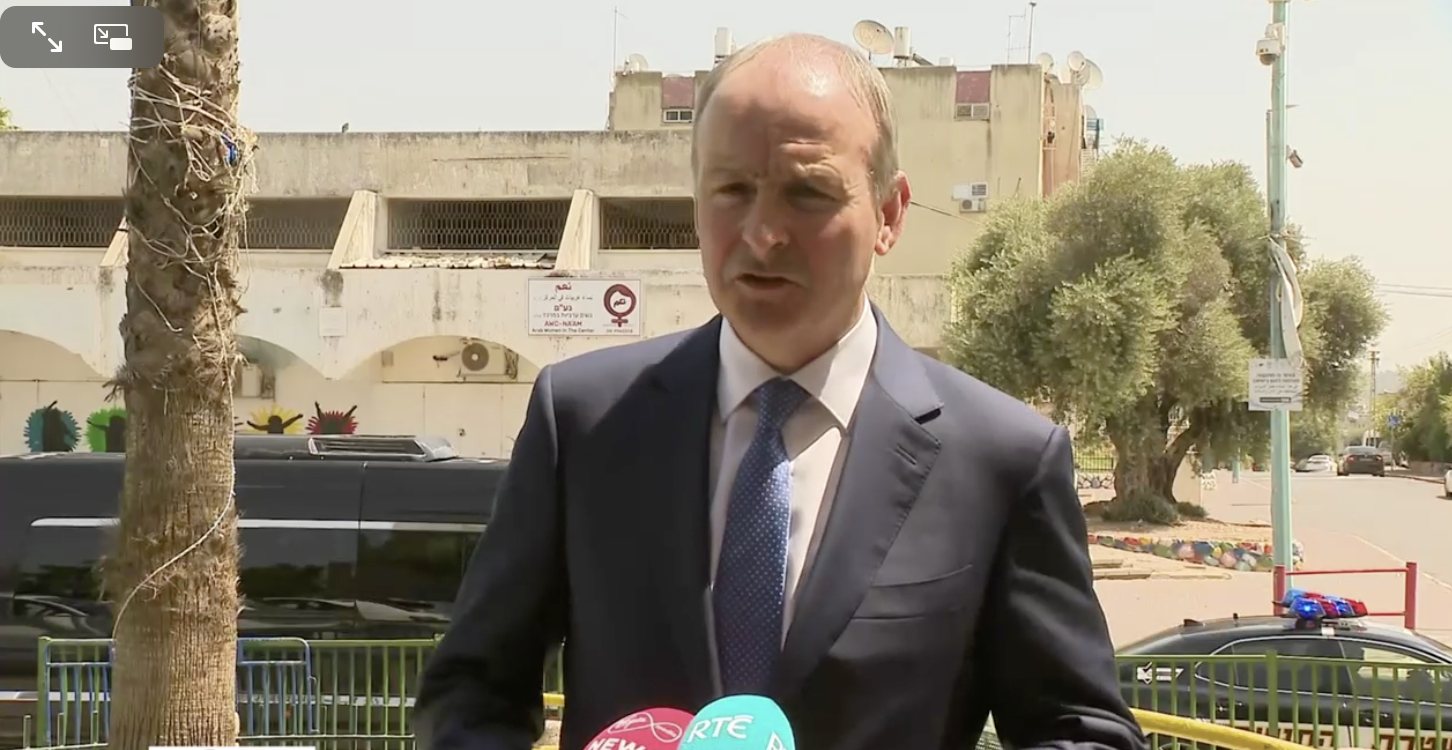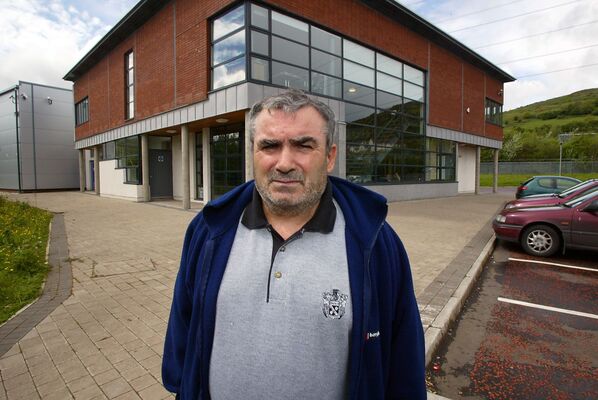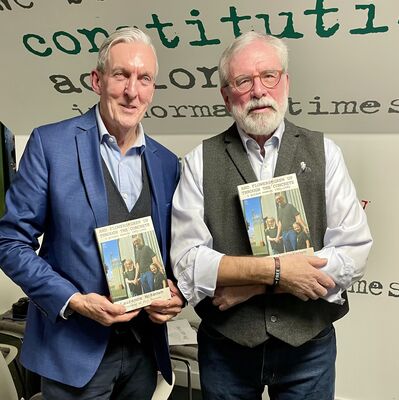THE Tánaiste and Minister for Foreign Affairs Micheál Martin recently visited Israel, the West Bank and Jordan. It was an opportunity for the Irish Government to take a firm stand against Israeli aggression and its apartheid system of governance. Instead Mr Martin became little more than a commentator on the ongoing and worsening crisis in that region.
While Mr Martin was occasionally critical in his public remarks of the expansion of Israeli settlements into Palestinian land and concerned at the daily attacks by Israeli settlers on Palestinian homes and families, there was little of substance to his visit. With Israeli Prime Minister Benjamin Netanyahu making clear there would be no change in Israeli policy and his government’s veto over any possibility of viable negotiations toward a peace agreement, it needs more than meaningless rhetoric from An Tánaiste. It needs action from the Irish Government to give peace a chance.
Three months ago members of the Commission of Inquiry on the Occupied Palestinian Territory, Including East Jerusalem visited Dublin. The Commission was established by the United Nations following the 11-day Israeli bombardment of the besieged Gaza Strip in May 2021. 250 Palestinians and 13 Israelis were killed in that period. While praising the cross-party approach in Leinster House, the Commissioners said: “At this stage of the situation on the ground, mere statements – no matter how progressive – are not sufficient. We need more action.”
Thank you to the students of Beitunia Vocational School for Girls for the warm welcome to Palestine today.
— Micheál Martin (@MichealMartinTD) September 6, 2023
An example of the impact that Ireland’s funding for education and skills is having within the community. pic.twitter.com/pJHjV2LwgS
There was no action from Mr Martin. Rather, he chose to urge the Palestinian leaders “to take risks in terms of the pursuit of peace".
In 2015 the Oireachtas supported a motion calling on the Irish Government to recognise the State of Palestine. It refuses to do so, claiming that such a move must be part of a new peace agreement. And yet Micheál Martin last week acknowledged that on the basis of his conversations with Israeli leaders “I don’t see any immediate signs of a change in direction.” And why should they when the Irish Government and others stand aside and facilitate Israeli aggression?
If the Irish Government is serious about peace in the Middle East it should move immediately toward recognising the State of Palestine and using its membership of the European Union and the United Nations and its international influence to persuade others to do likewise. It’s time for action.
Let's give this silent killer the attention it demands
THE month of September has been designated as Sepsis Awareness Month. Sepsis is not a condition that often attracts attention, but across the island of Ireland annually there are an estimated twenty two thousand cases of sepsis. Of these, approximately three and half thousand victims die. In the South, sepsis kills more people than breast cancer, prostate cancer and AIDS combined. Sepsis also is the number one killer in deaths in hospitals in the USA. Every year 350,000 people die from it.
While thousands of miles apart, two Irish families – one in Ireland and the other in the USA – who have been tragically touched by sepsis have initiated campaigns to draw attention to this silent killer.
Thanks to friends of the charity James & Timmy of the @2NorriesPodcast for their support during Sepsis Awareness Month 💛❤️ pic.twitter.com/2lTexx0lCt
— Irish Sepsis Foundation (@IrishSepsis) September 15, 2023
In New York in 2012, Rory Staunton, the 12-year-old son of Ciaran and Orlaith, died four days after taking ill. I knew Rory. He was an articulate, enthusiastic, intelligent and very astute young person. He fell ill after playing basketball in school where he slightly cut his arm in a fall. Overnight he became feverish, vomited and developed a pain in his leg. He was taken to hospital where essential warning signs were missed. He eventually ended up in intensive care but four days after the accident he died of septic shock.
Ciaran and Orlaith established the ‘End Sepsis, the Legacy of Rory Staunton Foundation' and have fought tirelessly since then to introduce ‘Rory’s Regulations’ – new rules and protocols to ensure that medical staff are trained to recognise the symptoms of sepsis. It is estimated that 20,000 lives in New York State alone have been saved by their efforts.
Last week, the case of 15-year-old Seán Hughes from Dublin was highlighted. He died from sepsis in 2018. His father Joe described his son as a “healthy young man” who was a “singer, entertainer, comedian and best friend to all who had the pleasure of knowing him.” Seán was a well known and popular rapper who had performed under the stage name Lil Red in the Aviva Stadium and the National Concert Hall.
In January 2018 he came home from school with what appeared to be flu-like symptoms similar to a chest infection. He was eventually taken to hospital where doctors were "baffled as they had absolutely no clue what was wrong.” Sean died after four days. The family only discovered at the inquest that the cause of death was sepsis, a disease they had never heard of before.
Like Ciaran and Orlaith in New York, Seán’s parents, Joe and Karen, decided to raise public awareness about sepsis. They have established ‘Lil Red’s Legacy Sepsis Awareness Campaign'. This includes Sean’s parents going to schools, colleges and sports clubs to make their presentation.
Well done to these two families who have courageously and despite their heartache got actively involved in trying to help others.
Awareness is hugely important but so too is training and resources for family doctors and hospitals. If you have concerns, information on sepsis is available at nidirect.gov.uk/conditions/sepsis and hse.ie/eng/about/who/cspd/ncps/sepsis/
Giving it up is easier said than done
A FRIEND of mine has told me that he is thinking of giving up the drink. He has been saying the same thing for the last ten years so you will understand if I don't take him too seriously. In the past his desire to be abstemious coincided with his hangovers. When the hangover retreated so did his desire to be teetotal. But this time he seems to be more serious.
“It’s my age,” he told me. “I’m not fit to drink the way I used to. A couple of pints and I’m stupored. And then I have to run to the toilet for the rest of the night, especially in the middle of the night. My bladder does be like a hard hat.”
He looked at me across the table. We were in a pub. He was drinking alcohol-free beer.
“Alcohol-free beer misses the whole point,” I observed., "and it probably has the same porous effect on your bladder.”
“Probably so,” he replied, “but the taste is the same and you don’t feel like a tube drinking water or a soft drink in company. There is also a limit on how much water you can drink.”
He gazed forlornly at my pint.
“We Irish drink too much anyway," he continued.
“No more than any other society,” I suggested.
“Maybe so,” he conceded, “but we drink differently. We drink to get drunk. Others drink with their food or in a measured way. A few glasses. Not us. We go out for a session. To get plastered. I can’t hack getting stocious any more.”
“Fair enough,” I agreed with him. “So drink less. You don’t need to get legless.”
“I rarely get legless,” he responded.
“I’m well able to hold my drink, you know that. But having just one or two drinks on a night out? That’s easier said than done," he said sadly.
“First you get the bottle, then the bottle gets you.”
“So how long are you off the drink?” I asked.
“Since last night.”
“I wish you well,” I replied, resisting the temptation to ridicule him.
“I'll let you know how I get on," he smiled determinedly.
“Are you off buying drink as well?” I queried. “Mine's a pint and it’s your round.”
“Maith go leor,” he said.
“By the way a wee bit of advice for you,” I continued.
“Don’t broadcast it that you are off the drink. Too many of our friends take pleasure when people go on the wagon and then fall off it again. Just say you’re not drinking that night. You’re driving. Or you’re minding the grandkids. Or you have something to do early in the morning.”
“Good advice,” he said. “Don't you tell anyone.”
“Okay” I replied. “My lips are sealed.”








